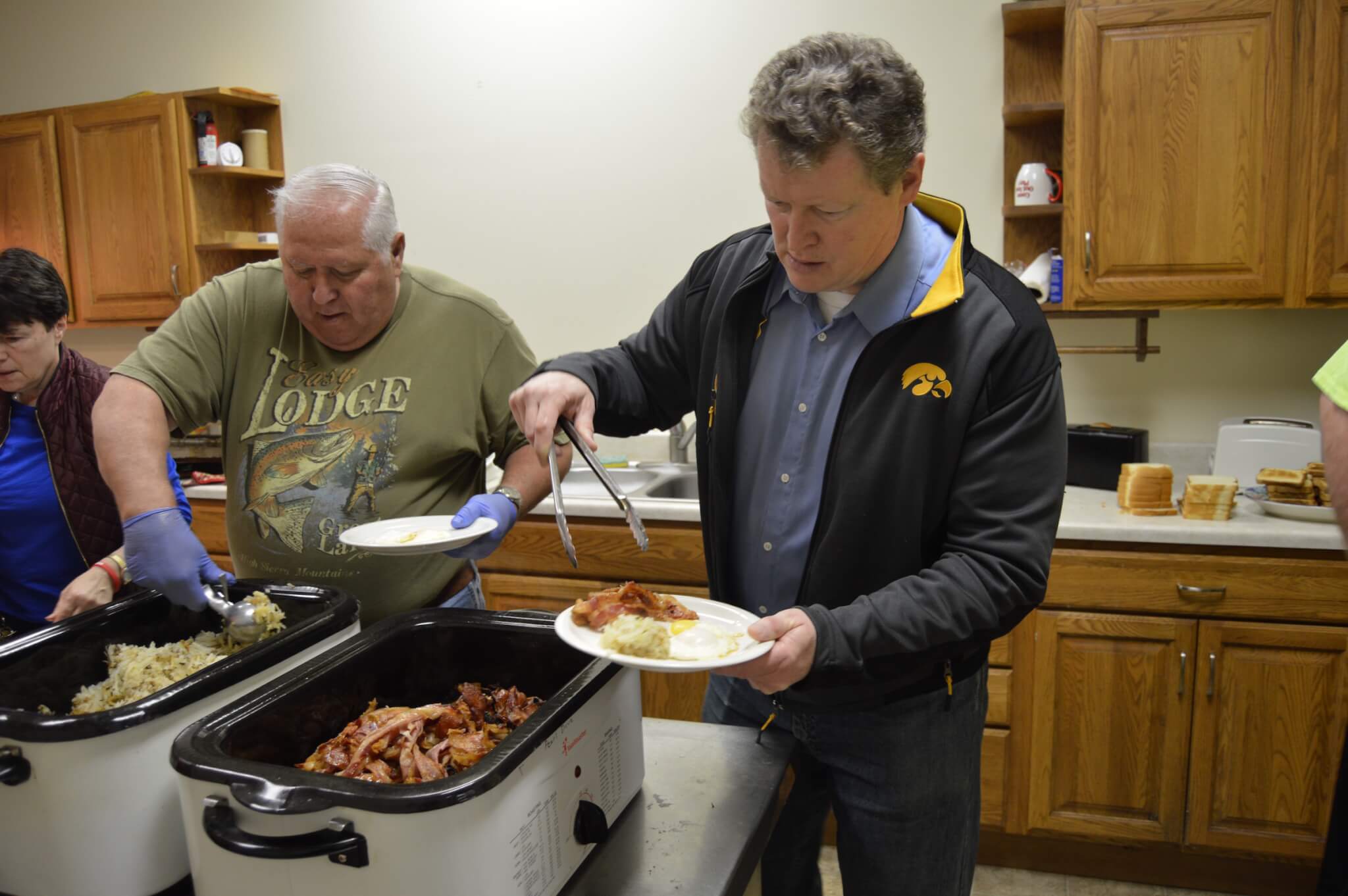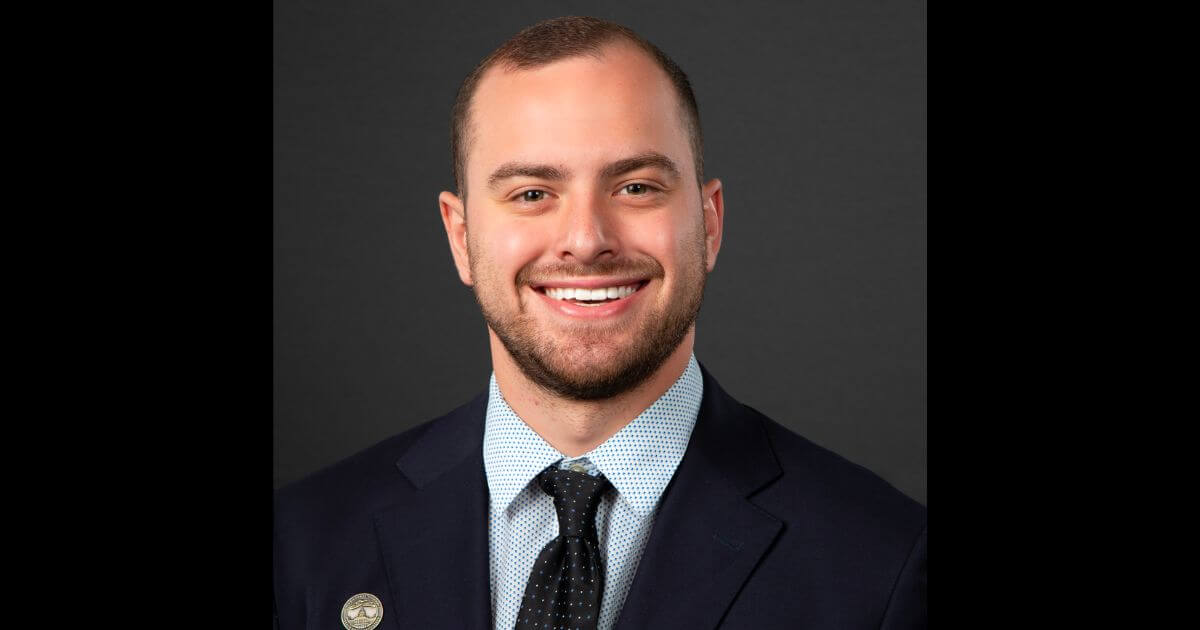
Murphy at the Labor Harvest food shelter
Iowa Starting Line will be doing a series of posts where we follow along a major primary candidate for most of a day as they campaign. We hope it gives a different, unique look into who the man or woman running for office is, beyond just their stump speeches and debate points. We followed Pat Murphy for a day the weekend before last:
Pat Murphy began his Saturday early in the morning, serving up a hot meal to the needy at 7:30 AM at the Labor Harvest food shelter near downtown Dubuque. It’s a volunteer service he’s done for over a decade, and a hotly contested primary with Cedar Rapids councilwoman Monica Vernon hasn’t changed up his Saturday morning schedule. Many of the residents who come for the meal likely won’t be voting in the 1st District Congressional primary next month.
“I know I’m much closer to being in those food lines than being at the country club,” Murphy says later, in a reference to both his primary and potential general election opponent.
The Labor Harvest program was started by several of the leaders in the local labor unions back in 1989, the same year Pat Murphy was first elected to office as a State Representative. This morning Murphy is pulling strips of bacon out of a steaming pan to add to plates of poached eggs, burnt toast and a clump of hashbrowns for meals for about 70 locals who come by.
Murphy usually helps out with the food distribution days, held on other weekends where they load up people’s cars with free food staples. Sometimes they supply up to 400 families.
“Don’t tell Francis I go past the curb,” Murphy jokes with the older labor member who helps run the shelter about carrying the food boxes out.
“I don’t want them to go over the curb because of insurance,” replies Francis.
It’s all friends here for Murphy, whose constant constituency outreach and visibility in the community during his years in the Legislature made him a popular leader in Dubuque.
“He’s the only politician I know,” one man says. “I don’t know any of the other ones, they don’t come around.”
“Dubuque will stick with him [for the primary],” predicts Jill, a volunteer. “We like the hometown boy.”
What will determine who the Democrats’ nominee is, however, will likely rest on many of the voters outside Murphy’s hometown.

Murphy talks with supporters at a fundraiser for the Labor Harvest shelter
This day Murphy is set on a singular mission: convince voters that Monica Vernon can’t be trusted because of her past affiliation as a Republican. Despite defeating her in the five-way 2014 Democratic primary, Murphy is now seen as the underdog in this one-on-one race with Vernon following his loss to Rod Blum in the last general election.
Fortunately, many of his friends are just on message as he is.
“So is Monica trying to buy the seat?” quips Francis while in the food shelter’s kitchen.
Murhpy has been hammering away at Vernon for her former Republican life in debates and campaign announcements for almost the entire race. It caused a little pushback the day previous to this one, with former Senator Jack Hatch getting a letter published in the Dubuque Telegraph-Herald slamming Murphy for “acting like a Republican” with his persistent criticism.
“No I’m not – I think this is a legitimate issue,” Murphy insists. “He’s totally irrelevant to it, but he wants to be relevant. I guess Jack will always think he’s relevant.”
Whether Jack Hatch carries much weight in the 1st District or not (one involved Democrat at the food shelter wasn’t familiar with the 2014 gubernatorial candidate), his alignment with Vernon is emblematic of the new dynamic in 2016.

Murphy’s truck that featured heavily in his 2014 ads
Murphy realizes he faces a tougher battle this time. Already many of the labor unions that backed him then have endorsed Vernon. She’s raised considerably more money. And Vernon also has had more time to campaign, jumping into the race mere weeks after Blum was sworn in.
“It is different this time around,” Murphy admits in an interview at a coffee shop in downtown Dubuque. “And there’s no question Monica had a six-month jump on me … I ran a grassroots race the last time, but we’re running a much more grassroots race this time. We know we’re not going to have as much money. We’ll probably have half of what we had two years ago.”
Part of the delay this time was due to his wife’s health – she hurt her leg in a 2014 parade. After three knee surgeries, she finally got a clean bill of health in February of last year. But Murphy himself wasn’t sure if he was ready again.
“When I lost in 2014, I thought I was done,” he says, noting he took some various jobs in construction, at a community college and some consulting for the Nevada Democratic Party after that loss.
But as he saw the 1st District field develop – early on it also included 29-year-old hotelier Ravi Patel and former Saturday Night Live actor Gary Kroeger – Murphy felt there wasn’t someone with a proven progressive record in the race. He sees his entire life as being an unapologetic champion for working class causes, as well as someone who uniquely understands the hardships of working people, and felt the need to get in again.
“I don’t know if [Vernon] knows what she’s doing other than she wants to be agreeable with people,” Murphy says. “You’ve got to tell people where you’re at, and I’ve done that for 26 years and I’ve taken heat for it.”
The challenge this time doesn’t dissuade him, and he points out that he’s been outspent in most of his successful elections.
Murphy returns to his house in the morning for a round of phone-banking throughout the district. He spends a lot of his time doing call time, but much of it is to likely primary-going Democrats, as opposed to just donor calls. Setting up on his living room couch, he opens the automated dialer program on his laptop, which he notes has saved him a lot of time when calling people. As soon as he starts, his dog Toto jumps up to sit next to him.

Murphy calling setup at home
“Are there any issues you’d like to discuss this morning?” Murphy asks the first person who answers.
“Hi, I’m the Democrat running in the 1st District,” Murphy starts with another, and then gets into a lengthy discussion about water quality in both Des Moines and Flint. “Iowa is actually the second-biggest contributor to the dead zone.”
“Are you mentioning what day it is, June 7th?” his wife, Teri, reminds him, sitting in a chair nearby.
“Only on answering machines, honey,” he replies.
“You probably won’t call them again,” she says.
Most of the conversations are productive, chatting with voters about Branstad’s Medicaid privatization, school funding and water quality. Having spent decades in Iowa’s political scene, he catches a few people on the phone he knows.
“Spread the word in Marshalltown, let them know I was a good guy, but don’t tell them everything,” he tells one activist he talks with there, asking him how Mark Smith, the Democrats’ current House leader, is doing.
“I’m feeling good about Marshalltown,” Murphy says after.
The longtime friendships Murphy’s built with Democratic activists throughout northeastern Iowa is the one thing that may yet win him the nomination. A lot of that has been through labor organizing networks.
“The first time I got involved in politics was 1968 against my will,” Murphy recalls of when his father, a union leader in the CWA, brought then-9-year-old Pat into their local office to help campaign. “The only thing interesting about their headquarters was in the toilet bowl they had a bumper sticker that said Richard Nixon. So I went in there a couple times to pee on Richard Nixon.”
Raised in an Irish Catholic union family, Murphy says he grew up discussing two of the three things you’re not supposed to around the dinner table: politics and religion (sex wasn’t an option for debate given the Catholic part). Murphy’s entire family is connected with unions and politics in one way or another. Aside from his father’s leadership position, one of his sisters worked with Cesar Chavez in California, a brother ran for public office, while another brother was fired from a job for refusing to cross a picket line.
Pat himself is a former teamster and two of his children are union members, including one son who serves as the Dubuque County Recorder. His wife led a grueling and high-profile effort to unionize nurses at Finley Hospital.
They don’t always see eye-to-eye within Democratic politics: his family’s support was divided between Hillary Clinton, Bernie Sanders and Martin O’Malley in the Iowa Caucus.

Murphy chats with voters in Monticello
Recruited to run for an open seat in a special election by some elected officials in 1989, Murphy spent 26 years in public office, rising to the Speaker of the Iowa House position in 2007.
“I never thought I’d sit in the Speaker’s chair,” Murphy says. “The day in caucus when Dick Myers announced his retirement, I started looking around the room and the thing that went through my mind was, ‘Which one of these bozos is going to take over the show.’ And a lot of them were looking at me.”
Murphy says he ran a caucus that rewarded loyalty and competency, and a willingness to do what was good for the Democratic caucus. He notes he made a number of enemies during that time, but that at the end of the day they accomplished a lot.
“I felt like we had a real progressive four years when I was Speaker: we did do the minimum wage, we did do universal pre-school, we did raise the cigarette tax, we expanded health care for about 25,000 kids,” Murphy says, adding that his proudest moments were passing civil rights legislation and the gay marriage ruling in 2009.
“I’ll never forget before it passed, the day before Mike Gronstal and I met and we knew something was up when they asked for extra state trooper protection,” Murphy remembers about the Varnum decision. “We didn’t think it was because gays and lesbians would storm the capitol, we just assumed it was going to be the right wing that was all upset.”
All of that is the record he hopes voters will look at in contrast to Vernon’s. And it’s a point he’s made forcefully throughout the primary, a campaign that has proven rather testy and negative by most Iowa campaign standards.

Murphy says bye to Toto before heading to the debate
After finishing his calls, Murphy got ready to take that argument directly to Vernon, who he was debating later in the day in Monticello.
“Can I get by with blue jeans or do I still have to wear a suit?” Murphy asks his wife as he heads upstairs to change his clothes.
“No, you still need a suit,” Teri insists.
“Alright, I was just hoping to get out of it,” he says.
Teri and Pat arrive to the debate site in the afternoon with their daughter Natalie with them, passing by Vernon’s numerous campaign staff as they enter the small town’s city council chambers. Only about 35 people are there to watch, about a dozen of which are staffers, media and a Republican tracker or two. Murphy shrugs off the Republican presence, reminding some of how they even followed him as he walked his dog through the neighborhood when he was the nominee in 2014.

Pat and Teri Murphy arrive to the debate
Murphy launches his attacks on Vernon in his opening statement, blasting her response in the previous debate about not being able to “connect the dots” on her past donations to Republicans. He stays on the offensive throughout the debate, tying nearly every answer back to Vernon’s past GOP affiliation, even George W. Bush’s Iraq War decision (read about the entire debate in this post).
Afterwards Murphy sticks around to chat with supporters and voters, before headed back to Dubuque for another labor-related event.

Monica Vernon with her team at the debate
Murphy’s day ends like how it started, serving up food at a $10-a-plate fundraiser at a Dubuque union hall to benefit the food shelter he was at in the morning. Several of the same volunteers from the shelter are there as well. Many have known Murphy since he first ran.
“The reason he won was because of his last name, Murphy, and because he had the biggest signs in the city. If you get all the Murphy’s in town to come out, you win!” joked Ralph Scharnau, an longtime labor activist.
They all largely describe Murphy in the same way: a working class person who will fight for you.
“A lot of the stuff he’s fought for, he’s taken heat for,” says Bruce Clark, the president of the Iowa Postal Workers Union and Dubuque Federation of Labor. “The Telegraph-Herald hates him … But as a working person, I couldn’t ask for a better representative than Pat, or a better friend. If you want someone in your corner, get Pat Murphy, he fights hard for working people.”

Murphy talks with longtime Dubuque labor allies at the dinner
That fighting demeanor has won Murphy a lot of loyalty over the years, but it’s also rubbed many people the wrong way. That may have added to some of the problems he’s faced in this primary election, as some organizations have left him over his loss in a Democratic-leaning seat, with many privately blaming Murphy. The feeling is mutual in some ways.
Murphy himself rebuts some of the criticism, explaining he out-performed Bruce Braley and Brad Anderson in the 1st District, and blames Hatch’s “invisible campaign” to some extent for pulling the rest of the ticket down. He wasn’t happy with the number of absentee ballots left on the field by the party either.
“If [the coordinated campaign] doesn’t agree to my stipulations beforehand this time, we ain’t doing anything with them. I was shocked to find out we weren’t chasing ballots,” he says.
And in all reality, he probably would be a Congressman right now had he not run in one of the worst Republican wave elections ever. And he’d likely make up the 2% difference against Blum from last time if he wins the nomination this time.
But he’s still got to get through the June 7th primary to have a chance to continue his life’s work in public office.

More food, more labor friends
“I will go on with life if I lose in June or November, I’ve already made that decision,” Murphy says. “The next time I lose I will be done with politics, whether it’s this year or in the future.”
Still, he thinks his message is resonating among the Democratic faithful that vote in these low turnout primaries. And he remains relentlessly on message even at the fundraiser dinner, recounting stories from the day’s debate with his friends. Throughout the day he’s projected a sense of confidence and seems at ease with where the campaign is at, just one more fight that he’s plenty used to.
“I’m proud of the record I’ve had,” Murphy says. “I’m comfortable in the shoes I’ve worn, and I won’t apologize for anything I’ve done. There’s some people who try to gauge what’s politically correct. With me, people know that if I say something I’m good for it.”
For the Democrats paying attention in the 1st District primary, they’ll have a clear choice on June 7th. Both candidates have presented unique personalities. Whether Murphy’s appeal, the labor working class progressive with a record, and also all the history that comes with him, is what they want this time is yet to be seen. But Murphy’s certainly not changing anything – he is who he is.
Read the rest of our A Day On The Trail Series of the major June 7 primary candidates:
Rob Hogg
Patty Judge
Pat Murphy
Monica Vernon
Desmund Adams
Mike Sherzan
by Pat Rynard
Posted 5/4/16

Lanon Baccam wins 3rd District Dem primary, will face Zach Nunn
Baccam defeats Melissa Vine to challenge Republican incumbent Lanon Baccam defeated Melissa Vine in Tuesday’s Democratic primary for Iowa’s 3rd...

Hardin County man running for office as Trump-loving Democrat to local party’s dismay
Brad Rewoldt, who recently changed his party affiliation from Republican, says his support of Trump will probably 'piss off' Democrats There is a...

Scheetz: Tax cuts for all Iowans, not just the wealthy
State Rep. Sami Scheetz says all Iowans should benefit from tax cuts via a sales tax reduction As a state representative, my job is to serve the...

Kalbach: What Iowa Republicans focused on during legislative session
Our state legislative session finished up towards the end of April, and I’m glad it’s over! From further de-funding and privatizing our public...

Advocates file suit to stop Iowa’s ‘unconstitutional’ immigration law
Immigration advocates filed a federal lawsuit Thursday to stop Iowa’s new immigration law—SF 2340—from taking effect arguing that the legislation...

Iowa Republicans make outlawing gay marriage key 2024 campaign priority
Iowa Republicans have made outlawing gay marriage a key goal in their 2024 party platform. During the Iowa GOP’s 2024 state convention on Saturday,...





